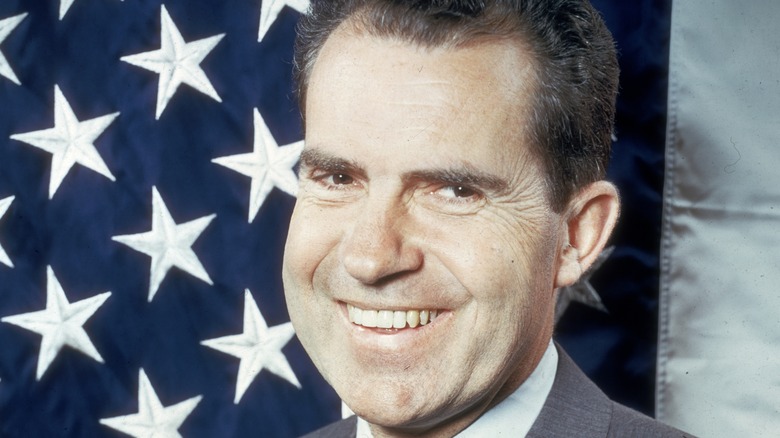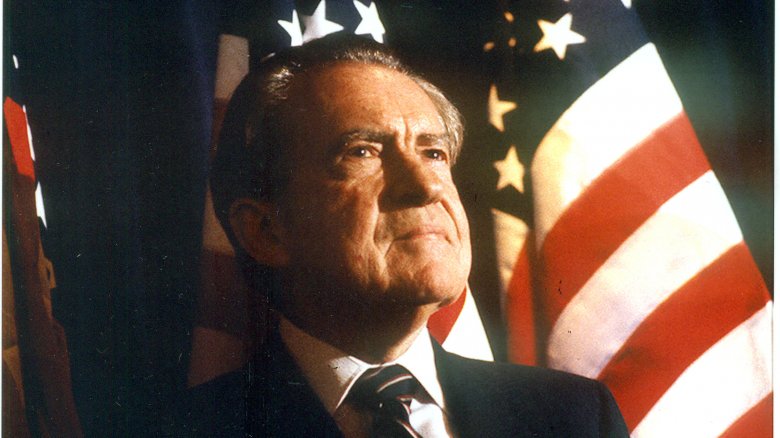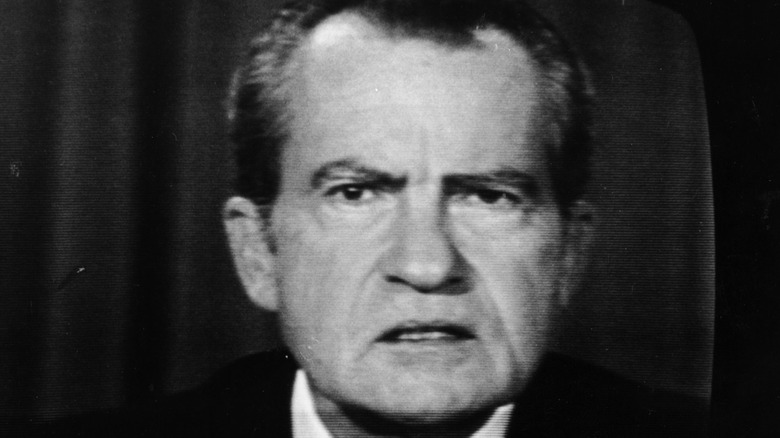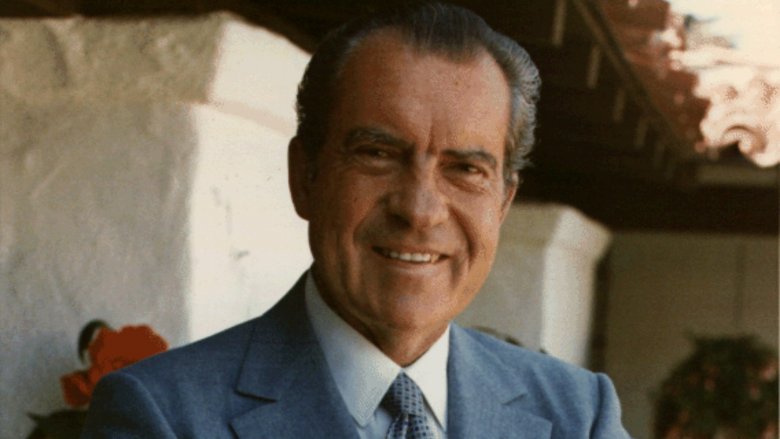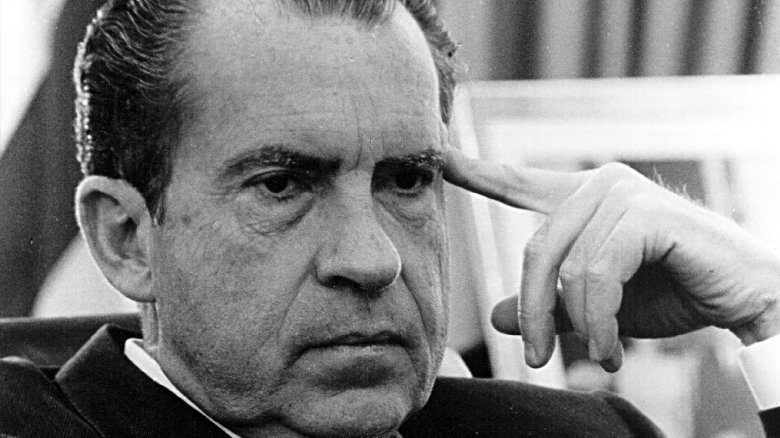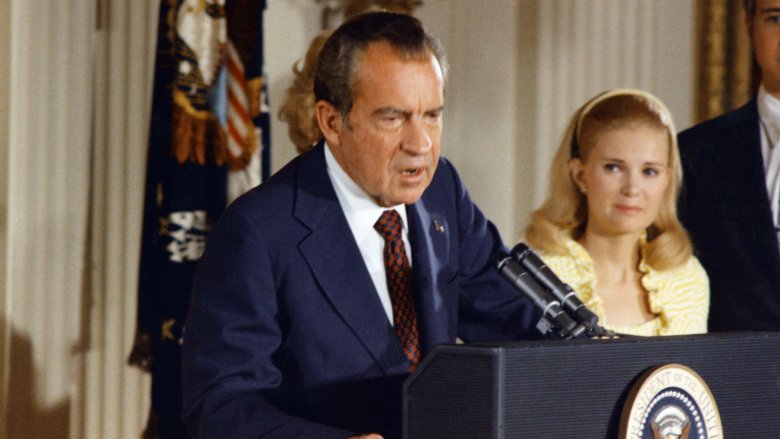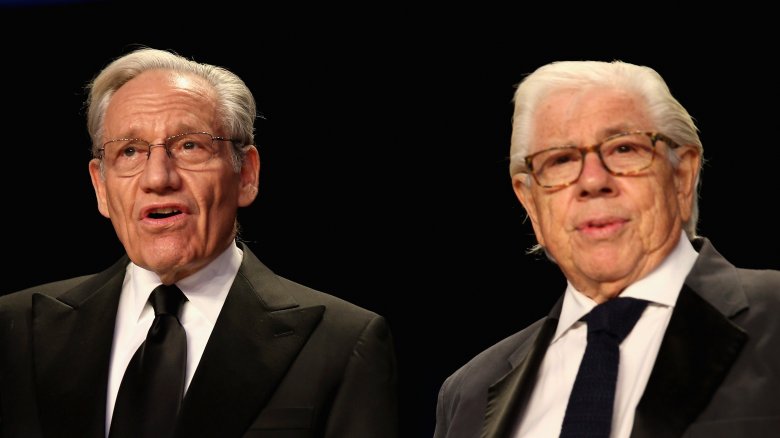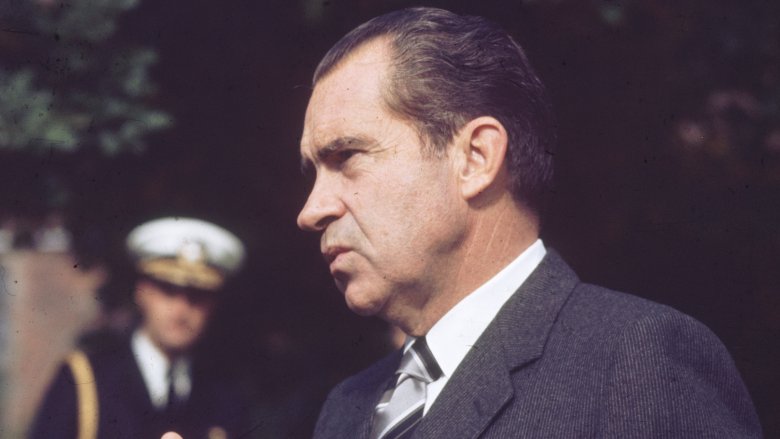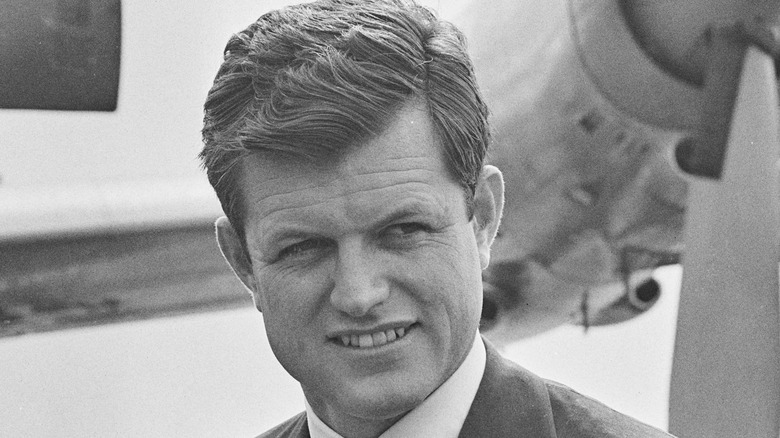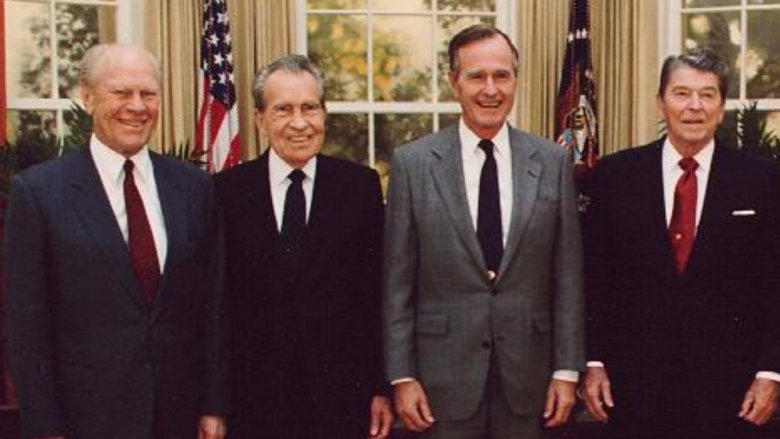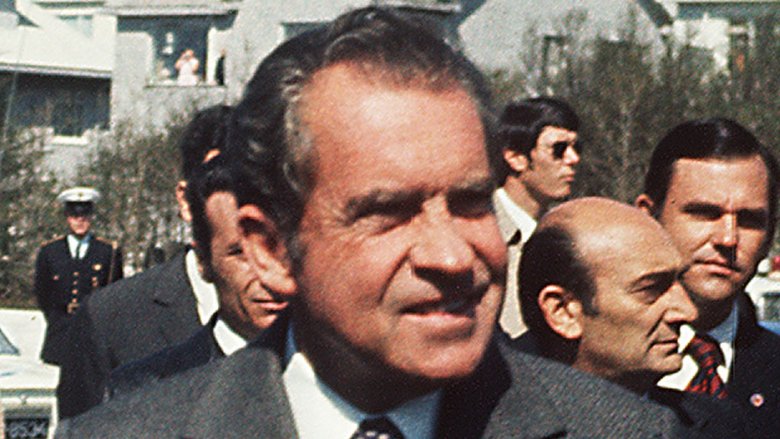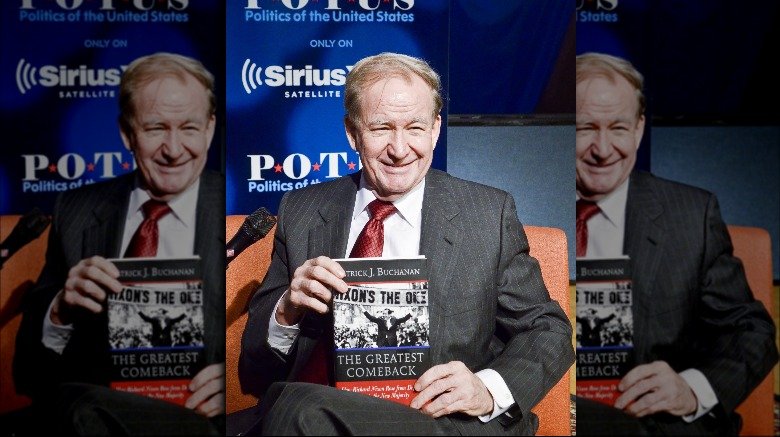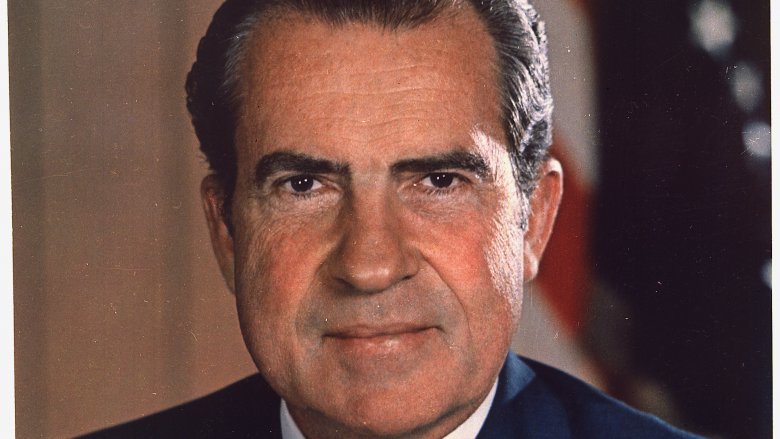Secrets No One Ever Told You About The Watergate Scandal
In perhaps the most blistering obituary ever written, Hunter S. Thompson said of the late Richard Nixon (via The Atlantic): "My mother hates Nixon, my son hates Nixon, I hate Nixon, and this hatred has brought us together." All that loathing came with a side of fear from Gerald Ford, who Thompson said talked about going to hell for pardoning Nixon. Ford's road to hell ran right past the Watergate.
The Watergate complex housed the Democratic National Committee headquarters in 1972. In the lead-up to that year's presidential election, five burglars were arrested attempting to tap the Democrats' phones and steal documents. The crooks were equipped with tear gas pens, locksmith tools, and cameras, as History details.
Congress and the Justice Department investigated Watergate, and Washington Post reporters Bob Woodward and Carl Bernstein traced the break-in to Nixon's reelection committee. According to The Daily Beast, the president denounced the investigation as "a witch hunt," demonized the press as "the enemy," and did his Tricky Dick-iest to hide the truth. As damning evidence of a White House cover-up mounted, impeachment seemed imminent, so Nixon resigned in 1974. Despite extensive coverage of the scandal, there are jaw-dropping details you might not know. As the late Gerald Ford might say, you're in for a hell of a story.
Watergate got in the way of an insane murder plot
In 1972, Richard Nixon was willing to do just about anything to enhance his chances of reelection. In an especially shocking plot, his White House "plumbers" — highly skilled henchmen whose members included Watergate ringleader G. Gordon Liddy and other Watergate accomplices, as per History — were tasked with murdering a journalist.
Nixon despised journalists. He spied on them, had their taxes audited, and attempted to censor them. But he reserved his bitterest bile for investigative journalist Jack Anderson, who had exposed some of Nixon's dishonest dealings back in 1952. In 1972, Anderson knew something about Tricky Dick that could get him impeached, and no, it wasn't Watergate. As Timeline described, in 1971, Nixon had his aides illegally leak classified tax documents to Anderson in order to undermine Alabama Gov. George Wallace.
Anderson, who had resumed writing damaging pieces about Nixon, was a threat to his presidency. So Nixon resolved to "eliminate" him by any means necessary and allegedly didn't object when his adviser Charles Colson recommended assassinating the journalist. G. Gordon Liddy — who later admitted the murder plot existed, according to NBC News, although others disputed it — suggested poisoning Anderson's Aspirin or lacing his steering wheel with LSD to cause a fatal car accident. However, the murder was never attempted because days later the plumbers were asked to orchestrate the crime that killed Nixon's presidency: the Watergate break-in.
How the Watergate break-in went wrong
The story of how the Watergate burglars were arrested reads like the confused lovechild of a spy novel and a zany police comedy. Five sophisticated criminals — most of whom worked for or had ties to the CIA and some of whom became suspects in JFK's assassination, notes ABC News — got caught off guard by three policemen masquerading as hippies because the crooks' lookout was busy watching the film "Attack of the Puppet People" in a nearby building. How on Earth did such a hilarious scenario come about? According to Bill Lacey, co-owner of PW's Saloon in D.C., it all started when a uniformed cop got too drunk to walk (via the Washingtonian).
The officer's name remains a secret, but around 2 a.m. on June 17, 1972, he received a call about a suspected break-in at the Watergate complex after a night watchman noticed that someone kept placing tape on a basement door to keep it unlocked, as per ABC News. The officer claimed he was "low on gas." (Lacey claimed the officer was hopped up on bourbon.) So the dispatcher called the "bum squad," a trio of undercover cops posing as hippies. A squad car might have caught the lookout's attention, but the bum squad went unnoticed at first. By the time the lookout stopped looking at "Attack of the Puppet People" and determined that men with guns weren't his co-criminals, the officers were on the sixth floor.
Gemstone: the broader context of the break-in
Watergate is often discussed like an isolated crime, but it was part of a larger operation called Gemstone. The diabolical brainchild of ex-FBI agent G. Gordon Liddy, Gemstone was intended to help get Richard Nixon reelected through covert undertakings with gem-themed names. Some of the missions Liddy envisioned were way worse than Watergate. Citing the Senate Watergate report and Liddy's autobiography, the Independent reported that he wanted to organize "mugging squads and kidnapping teams" to silence anti-war protesters. A separate plot entailed funding a presidential run by Black Congresswoman Shirley Chisholm with the aim of creating racial and gender-based division among Democrats. A more salacious plan required putting prostitutes on a yacht rigged with surveillance equipment to spy on the Democratic National Convention.
The most audacious version of Gemstone had an estimated $1 million price tag, but a scaled-down $250,000 version was approved. Additionally, there was a separate "dirty tricks" program that utilized spies and disinformation campaigns that broke the law in at least one instance, as per The Washington Post. The vast array of sabotage operations involved 50 or more operatives, including future Donald Trump associate Roger Stone, who proudly has Tricky Dick's face tattooed on his back, according to The New Yorker. In 1972, Stone smeared one of Nixon's Republican challengers by making a donation to his campaign on behalf of the Young Socialist Alliance and sending proof of that payment to a newspaper.
A year before Watergate, Nixon planned a different impeachable break-in
Richard Nixon always denied ordering or even having advanced knowledge of the Watergate break-in, notes The New York Times. However, there's undeniable evidence that he planned a similar crime, as per the Miller Center. On June 17, 1971, exactly one year before the Watergate break-in took place, Nixon discussed breaking into the Brookings Institution (via History).
It all stemmed from Nixon's trickery during the Vietnam War. In 1969, he began secretly carpet-bombing Cambodia, killing up to 500,000 civilians. Meanwhile, he publicly promised to decrease America's involvement in the war. Determined to make his bull crap smell like honesty, Nixon covered up the CIA-approved murder of a possibly traitorous Green Beret who had knowledge of the bombings. The cover-up prompted a disillusioned military analyst named Daniel Ellsberg to leak the Pentagon Papers, which exposed vast deception by the U.S. regarding Vietnam.
Nixon reacted to the leak by trying to find Vietnam-related dirt on ex-President Lyndon Johnson in hopes of blackmailing him. In a recorded meeting Nixon advocated using the Huston Plan (which was designed for illegally spying on domestic terrorists) to steal supposedly incriminating documents about Johnson from the Brookings Institution. Thirteen days later he recorded himself ordering the break-in, as per SFGate. There's no proof that the burglary occurred, but according to an attorney who served on the Senate Watergate committee, simply giving the order was a trangession worthy of impeachment.
A future U.S. ambassador allegedly beat a woman to silence her
In 2017, Stephen King was named ambassador to Poland. Not to be confused with master of horror Stephen King, Ambassador King might have done horrifying things as part of Richard Nixon's Committee to Re-Elect the President, fittingly referred to as "CREEP." Per Newsweek, King supposedly took great pains to cover up Watergate and inflicted even greater pain on a woman named Martha Mitchell.
Mitchell was married to Nixon's campaign director and apparently knew a thing or two about Tricky Dick's dirty tricks. She also knew that Watergate burglar James McCord was CREEP's security director, not some "private security contractor" acting on his own as her husband publicly claimed. Mitchell was preparing to share that info with reporter Helen Thomas when King reportedly burst into her hotel bedroom, tossed her across the bed, and "ripped the phone out of the wall." When Thomas called back, the operator said Mitchell was unavailable. A crime reporter tracked down Mitchell and found her badly bruised.
King allegedly trapped and attacked Mitchell and had her sedated by a doctor. CREEP operatives dismissed the allegations as the ravings of "an out-of-control alcoholic" or someone who was having mental problems. King resigned but got promoted to campaign security chief. When asked about Mitchell's claims, King claimed he basically had no comment.
Deep Throat might have wanted Nixon to stay in office
One of the much-sung heroes of the Watergate scandal was a man best known by his awkward-to-Google alias, "Deep Throat." Then the FBI deputy director, Mark Felt, who revealed his true identity in 2005, as per History, anonymously corroborated information obtained by Washington Post reporters Bob Woodward and Carl Bernstein (above), who were instrumental in exposing Richard Nixon's Watergate cover-up. Though not their only anonymous source, as Newsweek reports, he was by far the most famous and has often been characterized as the quintessential honest whistleblower. Woodward would write in 1974's "All the President's Men" that Deep Throat simply wanted to protect the integrity of the presidency.
In 2010, Woodward slightly revised his assessment. He still attributed patriotic motives to Deep Throat but noted that the whistleblower was also deeply disappointed about not being appointed as FBI director. The man who landed the top spot was Assistant Attorney General Pat Gray. Evidently resentful, Felt sometimes lied to Woodward in ways that specifically undermined Gray. He seemed to be gunning for the director's job by turning Nixon against him.
Maybe the truth about Deep Throat is hard to swallow. Author Max Holland pored over Watergate-related FBI records and Felt's memoirs and came to a radical conclusion. "Getting rid of Nixon was the last thing Felt ever wanted to accomplish," Holland posited (via Politico). "Indeed, he was banking on Nixon's continuation in office to achieve his one and only aim: to ... become director."
The Secretary of Defense likely committed treason
By 1974, Richard Nixon had run out of closet space for his skeletons. Per the Daily Beast, Secretary of Defense James Schlesinger watched with increasing unease as stress reduced the president to an angry, paranoid mess who went on tirades about enemies and doused his insides with booze. Worried that Nixon would literally do anything — including nuking a country or mobilizing the military — to cling to power, Schlesinger, by his own admission, commanded the Joint Chiefs of Staff to "ignore any White House military initiatives lacking his signature."
If what Schlesinger confessed to is true (and most historians think it is), he committed treason, albeit for patriotic reasons. Considering Nixon's history of ordering nuclear strikes, Schlesinger's fears seem pretty justified. As recounted in "The Arrogance of Power: The Secret World of Richard Nixon" (via the Guardian), Nixon was receptive to the idea of nuking Vietnam back in 1954, 14 years before being elected president. Once in office, he frequently talked about bombing other nations to oblivion while hitting the sauce.
In 1969, a soused Nixon straight-up ordered an attack on North Korea in retaliation for a downed U.S. spy plane. Luckily the Joint Chiefs disobeyed and waited for the president to get sober. Secretary of State Henry Kissinger reportedly complained that "if the president had his way there would be a nuclear war each week!"
Richard Nixon used the Secret Service to spy on Ted Kennedy
It's no secret that Richard Nixon couldn't stand the Kennedy clan. JFK not only bested him in the 1960 presidential race but partly did so by exploiting a financial scandal involving Nixon's brother, Donald Nixon. The scandal also dashed his hopes of becoming California's governor in 1962. So in 1972 "Nixon's worst fear," according to SFGate, was that Sen. Ted Kennedy would enter the presidential race unexpectedly and win.
Richard Nixon set out to ruin Ted Kennedy's reputation. He assigned two Secret Service agents to spy on the senator under the pretense of protecting him. Since Kennedy wasn't a presidential candidate, he wasn't technically eligible for that kind of security, per the Guardian. But Richard Nixon feigned concern about potential assassination attempts. (Behind closed doors he said of Kennedy, "If he gets shot [after the election], too damn bad!") Richard Nixon also enlisted one of his henchmen to dig for dirt, which proved to be a huge mistake. Per the Daily Beast, journalists Bob Woodward and Carl Bernstein caught wind of the spying, which led them in the direction of linking the president with Watergate. Meanwhile, Kennedy convinced the Senate Judiciary Committee to investigate the break-in and advocated creating a special prosecutor. So while he didn't ruin Richard Nixon's reelection plans, he's a major reason the president didn't finish his second term.
The push to impeach Nixon was plagued by partisanship
Watergate is often heralded as an example of Democrats and Republicans coming together to condemn a horrendously corrupt president. But Michael Conway remembers it differently. He acted as counsel for the House Judiciary Committee during the Richard Nixon impeachment inquiry, and in 2018, he and journalism professor Jon Marshall recounted how partisan things got in The New York Times. Republicans largely sided with their guy, Nixon, evidence be damned. Then-Sen. Bob Dole dismissed incriminating media coverage as "unfounded and unsubstantiated allegations" and accused The Washington Post of aiding in political "mudslinging." Sen. Howard Baker, who had a reputation for "putting principle over party," tried to assist Nixon in strategizing, and Baker's staff leaked info about Congress' witnesses to the president.
Even when Nixon's guilt became painfully obvious, prominent Republicans defended him anyway. Per FiveThirtyEight, as Nixon aides resigned in disgrace, Tricky Dick received reassuring phone calls from future presidents Ronald Reagan, who was governor of California, and George H.W. Bush, who headed the Republican National Committee. Many Republicans didn't even budge after the Saturday Night Massacre, when Nixon tried to fire the Watergate special prosecutor, prompting two Justice Department officials to resign. When Congress voted on whether to recommend impeachment for three separate offenses, 10 of the 17 Republicans on the committee voted no on all counts, and just 6 of 17 supported impeaching Nixon for obstruction of justice despite obvious evidence.
Richard Nixon's outrageous cover-up schemes
Possibly the truest thing Richard Nixon ever said was the line that defined his presidency: "It's not the crime that gets you ... it's the cover-up," as per "Covering American Politics in the 21st Century: An Encyclopedia of News Media Titans, Trends, and Controversies," by Lee Banville. Of course, covering up a crime is also a crime, notes Cornell Law School, as is interfering with a federal or Congressional investigation. Then again, Nixon also said, "When the president does it, that means it is not illegal" (via The Guardian). Maybe that's why he considered going to obscene extremes to cover up Watergate.
Some of Nixon's schemes are well known, such as the infamous firing of special prosecutor Archibald Cox or the fact that he asked the CIA to thwart an FBI investigation into Watergate, as per the Los Angeles Times. But people may have forgotten that Nixon seriously considered making $1 million in hush-money payments to the Watergate burglars after one of them tried to blackmail him for $120,000, reports The Washington Post. We know this because he freaking taped himself talking about it. How would Nixon have covered such an outrageous expense? Presumably the same way the burglary was funded: through campaign funds and money that was allegedly laundered in Mexico, as per The New York Times. He also considered pardoning one of the burglars.
Covering up Watergate might have been easier if Nixon hadn't taped himself talking about it, but he tried to cover up the discussions of the cover-up. Before the Supreme Court forced him to release the recordings, as per History, he tried to have a partially deaf senator transcribe them instead of submitting the actual tapes to investigators, notes the Brennan Center.
The missing memo page that may have implicated Pat Buchanan
Perhaps the most quoted moment from the Watergate hearings was when Sen. Howard Baker asked, "What did the president know and when did he know it?" (via PBS). Investigators also wanted to know what Pat Buchanan (above) knew. Buchanan was Richard Nixon's speechwriter and an opposition researcher. During the Watergate hearings he testified that he knew nothing about the White House's attempts to sabotage Democrats.
Nowadays many people associate Buchanan with President Donald Trump. That's because Buchanan is a pioneer of paleo-conservativism, which champions nationalism, economic protectionism, and Christianity. You might have recognized those tenets as prominent themes in Trump's 2016 presidential campaign. As Esquire described, "Buchanan begat Trumpism." Buchanan also ran for president — three times, in fact. During one of the runs, the Ghost of Watergate Past paid a visit.
When Buchanan ran for president in 1996, The Washington Post ran a story about a memo given to Watergate Congressional investigators that turned out to be missing a page. That page, which the investigators never saw, contained Buchanan's recommendations for "political espionage against the Democrats" and hints that he knew about more nefarious undertakings. The assistant chief counsel for the Watergate Senate Committee said the missing page seemed akin to Nixon's "dirty tricks program," which didn't reach Watergate levels of illegality but resulted in a six-month prison sentence for a "White House-hired political saboteur."
The Watergate road map finally became public in 2018
Legal experts disagree on whether a sitting president can be indicted for a crime, as noted in The Atlantic. In Richard Nixon's case, Watergate special prosecutor Leon Jaworski opted not to pursue an indictment. Furthermore, the Justice Department adopted a policy of not indicting sitting presidents. However, Jaworski provided some guidance for impeaching Nixon if the evidence led Congress in that direction. Brookings Institution fellow Benjamin Wittes explained that the road map "contains no judgment, no argumentation [and a] very spare recitation of facts" (via NPR). It also laid the groundwork for relaying those facts to Congress in a legal way. For decades the road map remained shrouded in mystery, but in 2018, it finally became public.
According to legal academics at the Lawfare blog, FBI general counsel Jim Baker and Harvard Law student Sarah Grant took a look at the evidence and noticed something interesting: Nixon had inappropriate communications with at least two Justice Department officials. One was the assistant attorney general of the department's criminal division, Henry Petersen, who oversaw the efforts of the U.S. Attorney's Office in Washington, D.C., and the Federal Bureau of Investigation to look into the Watergate scandal. The other was Attorney General Richard Kleindienst, who ultimately recused himself from the Watergate case and resigned 15 days later. Nixon specifically asked Petersen if the investigation implicated him. The House Judiciary Committee appeared to reference such communications in its articles of impeachment.
